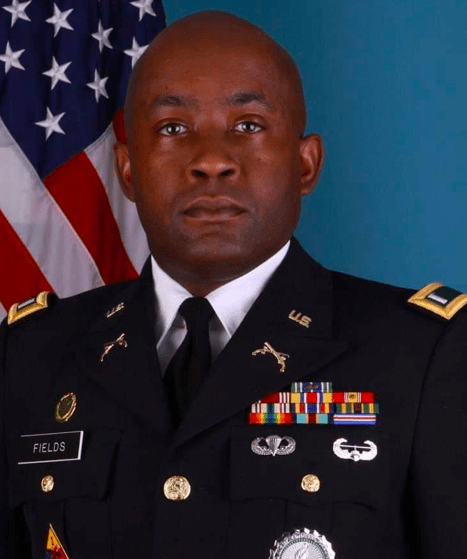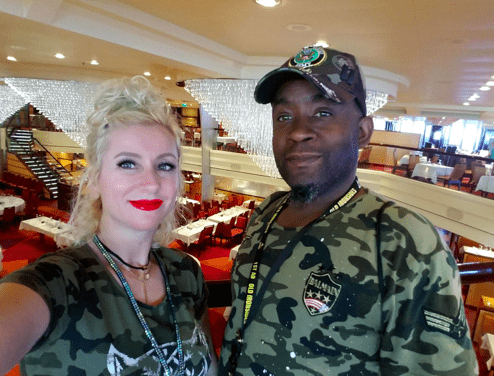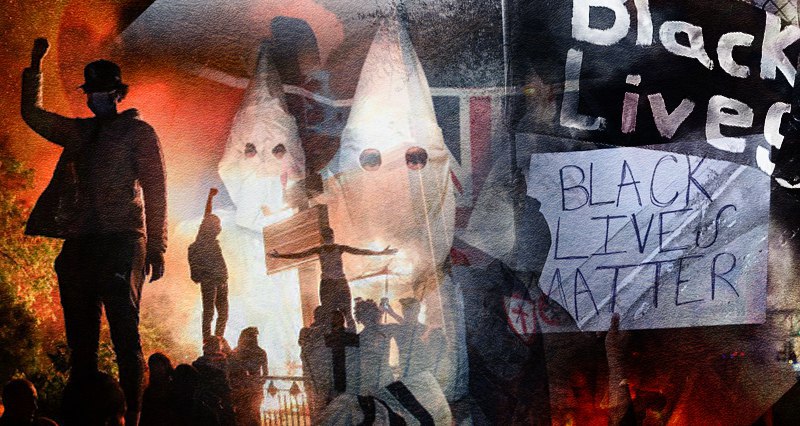‘Black Lives Matter’ protests continue in the United States over the death of George Floyd, an unarmed black man who was killed after he was pinned down by a white police officer in Minneapolis, Minnesota, on May 25, 2020. Not long after, another black man, Rayshard Brooks, 27, was shot dead by an officer, adding more fuel to the fire of public rage.
While the protests continue against the police brutality and racial discrimination, we discussed these events with Andre Fields, a former Military Police Officer in the US Army.
Fields answered our questions on the protests and racism in the US.

1. Could you please tell us about yourself?
I am currently an Assistant Principal (Administrator) for a high school that has a high minority population. I also teach Accounting and Business Law for a local college. I am also a former police officer for an urban city with a majority black population and former Military Police Officer in the Army. I have a Bachelor’s Degree in Business Administration Finance, a Bachelor’s Degree in Criminal Justice, a Master’s Degree in Education Administration, and I am currently working on a Doctor of Education Degree in Organizational Leadership. I was born and raised in Chicago, Illinois, but my wife and I live at Fort Hood, Texas, which is a few miles north of Austin, Texas. My wife is a Turkish National who also served in the U.S. Army, and we have a 5-year-old daughter together.
2. All the world is watching the George Floyd protests in the US. What is the essence of the protests? How do you evaluate police violence in the US as a former officer?
The essence of the protests is an outcry for equal treatment of minority races (mostly Black and Latino in the United States). Although the protests were sparked by police violence, this is only one of many issues that are faced by racial minorities. The police violence in the U.S. is a result of an increase in police presence, an increase in power of the police, and a reduction in oversight. The police have too many interactions with citizens that can escalate into violence even if the alleged crimes themselves are not violent. Because the crime rates in most major cities are higher than others, and the majority of the population are minorities, added to the fact that most of these minorities are poor, the police tend to target these minority groups as being violent offenders. Because of this, some police officers believe that Black and Latino citizens are violent, so when they interact, they have a heightened sense of awareness and will not de-escalate a situation. Because this systemic issue has gone on for so long, minorities are often stopped by the police even when they have done nothing wrong. They will argue with the police to prove their innocence; the police believe they are lying, the argument escalates, the police threaten to arrest, the person tries to get away, then violence ensues. From this point, even if the police stopped the person for something minor, they will have other significant charges added for resisting the arrest. Because there is not enough oversight of the police, minorities do not have a voice.
3. What are the main demands of the protesters? Where will all of this end up?
The demands of the protestors are for police reform. They want police departments to be changed to address the issues I mentioned above. But as I said, there is a larger issue of inequality going on in this country. Minorities are treated like second class citizens in the eyes of some white people, law enforcement, education, and politics. I believe that as we move forward, there will be change, but have a long way to go to have the significant change that is needed to make all people equal. All need to be treated as humans and receive the same rights and opportunities regardless of skin color. I believe the protests will stop when nationwide reforms in policing are announced, but the struggle will not end until equality is given across the nation.
4. Have you been exposed to racism in the US? Is it still as prevalent a problem as the protesters suggest?
I have been exposed to many forms of racism in my life. I was denied entry into a top high school because they said they had “reached their quota of Black students.” I was unlawfully stopped by the police once because they saw me with a white girlfriend and tried to make up a crime to arrest me, just because of this. While I was a police officer, I was harassed by another police officer because he said I looked like I did not belong in the neighborhood I lived in. Those are only a couple of minor issues, but there are many more that I do not have time to write about here.
Racism is still a problem in the United States, but not as overt as it was a few years ago. Today we face systemic racism, meaning some systems have been in place for a long time that held minorities, especially blacks, down years ago, but those systems have not been lifted or fixed. The police system is just one of them. In the not too distant past, blacks were not allowed to attend school. Once we were allowed, we could not go to white schools. Then, once we were allowed to go to white schools, we could not get in because we were not smart enough. But we were considered not smart enough because we went to primary school in the areas that we were forced to live in, which had inadequate education systems. These systems were not well funded because they were black schools. If you did not go to a good college or didn’t go to college at all, you were forced to work a low wage job, which left you living in poverty and crime-filled areas. This system still exists. It has gotten better over the years for some, but the system is still not set up for equality and leans heavily against Blacks and Latinos. Most Blacks and Latinos still face this problem with the education system.

5. Can you tell us more about how African and Latin Americans have been affected by the Covid-19 pandemic? Is there any discrimination in the healthcare system?
During the pandemic, African-Latino Americans are at the highest risk for COVID-19. The statistics on the television show that we are contracting and dying of the virus at higher rates. The reason this is happening is that Blacks and Latinos tend to live in high poverty areas with less access to healthcare and fewer opportunities to social distance. Because we tend to be poorer, we have to live in households with more people living in them. Blacks and Latinos also tend to work most of the jobs that are considered essential because they are the jobs at the bottom that no one else wants, but we have no choice to work. Jobs like in public transportation, restaurant workers, janitorial and cleaning crews, and all the jobs behind the scenes that most people do not think or care about. If they do not work, they do not get paid. If they do not get paid, they cannot support their families. So they go to work, and just like my step-sister, die of the virus because she came into contact with someone contagious while working because she had no choice.
6. How do you evaluate the reaction of the government?
The reaction by the Federal Government has been shameful. Instead of hearing the concerns of the protestors and sympathizing, our president has instead tried to address it with more police brutality and not siding with the majority of the American people. While I do not politically agree with the president, he could have gained a lot of respect if he had addressed the problem instead of vilifying the protestors. This causes him to look like a racist person, and anything he says to address it from this point will seem empty and disingenuous.
7. As everyone knows, the next presidential elections will take place this year. It seems clear that Democrats are trying to use the protest movements for their own benefits. What do you think about this strategy? How might these movements affect the election?
I do not believe the Democrats are using this for their own benefit. These are issues that the Democrats typically fight for. The idea that they are using this for their own benefit is a lie told by the Republicans to convince people to vote for them and for President Trump. The republicans do not have social justice as a platform. For them, money and the economy are more important than people. I believe this movement will hurt President Trump in his reelection. His failed response to this movement and his failed response to COVID-19, which has just further shown he does not care about minorities, will lose him votes amongst minorities and even whites that sympathize with the movement.
8. Is there anything else you would like to add?
The only other thing I would add is that most people in this country are not racist. However, the systems that were put in place before, during, and after slavery to keep Blacks down have not all been eliminated. Some of those systems still hurt Blacks today because of the effects over time. It starts with education. Schools need to teach equally. All public schools should have equitable funding. In those schools, students should be taught cultural sensitivity and how to treat people, how to be global citizens. Then, equality in the workforce and equality in treatment by the police will reduce the crime rates. More people with good jobs will also reduce crime rates. When crime rates are reduced, and more people are better educated, less police presence is required. Both of these will put money back into the economy. It is in our country’s best interest to treat equally, but when a small group of white men controls the country with money and power, a majority of people suffer. Minorities suffer more because of systemic racism that can be fixed.
Thank you for taking the time to read this, and I hope this information will be useful to your site and help spread awareness! This is not just a US cause; this is a cause that is global. All nations should take this seriously and ensure that ALL humans are treated equally.

















Leave a Reply